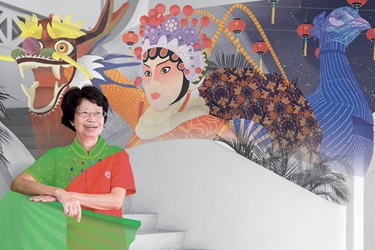Seeing the Unseen

A late night’s walk through the red light district in Geylang, a 2am trip to the Jurong Fishery Port or going “leak hunting” with a PUB water engineer in the pre-dawn hours may not sound like your typical options for an educational field trip. But these visits were indeed part of an elective seminar for first-year residential students of the National University of Singapore’s College of Alice and Peter Tan (CAPT).
Called Hidden Communities, the seminar aims to introduce freshmen to the lives and stories of those who are typically “unseen” or marginalised. Students trail these people at work, visit them at home or invite some of them to the college to share their experiences.
Student Ong Wen Yi had a sobering encounter when her class visited some low-income families that Beyond Social Services, a voluntary welfare organisation, works with. She met a woman struggling to keep her family together. “I admire and respect how she instils values in her children of loving each other and their father, despite him not carrying out his responsibilities well,” she said. “This visit got me thinking that happiness is what we decide for ourselves. These families may be poor financially, but they are definitely rich in their values and beliefs.”
Course instructor Dr Tan Lai Yong is no stranger to marginalised communities. The medical doctor spent 15 years in Yunnan, China, with his family, providing medical aid to poor villagers and training “barefoot” doctors. But Hidden Communities is not aimed at “making social workers out of everyone,” said Dr Tan, who is Director for Outreach and Community Engagement at the college.

Top right: The students conduct oral hygiene education and checks for foreign workers as part of their Hidden Communities coursework.
Bottom right: The students discuss issues and policies during the Hidden Communities seminar.
“A successful businessman, a skilful engineer – these are people who don’t only have technical competencies but also are connected, aware and able to relate to people,” he pointed out. “Our problems, and the solutions, are multidisciplinary so we need to integrate technical competence and [understanding of ] community needs.” Building empathy is one way to achieve this since an empathetic person is able to network, connect and listen. “A person with empathy learns well, leads well,” he added.
Dr Tan believes that everyone has the capacity to empathise. “Muscles can be built, but whether a person wants to use the muscles daily in the right way, or neglect or abuse them, it’s up to them. Empathy is like that. We want to lay down some scaffolding and let the person try to exercise their empathy.”
The atypical field trips – meeting workers at the fishing port or visiting low-income families – allow students to interact with people beyond their usual social circles.
Co-instructor Sue Koh, Associate Director for Outreach and Community Engagement, said the experience has given students a fresh perspective of the world: “Many said ‘I never saw it like that’, or ‘I never thought of it that way’.”
After listening to stories and meeting the marginalised groups, the class goes on to read related policies and statistics on those groups, to debate and reflect on them. “The idea is not to provide answers but get students to think about issues,” Ms Koh added.

All this has potential long-term implications, said Dr Tan: “Our students will go on to be heads of departments, managers, policymakers, leaders – they have to understand more than the job.” This means the ability to connect and relate to others and be aware of their varied needs. An employer, for instance, may have a staff member with a sick parent or a child with special needs, so “how do we recognise these different issues and cater to them?”
Being aware of such scenarios and of marginalised communities means we can think about how to be more inclusive in our actions, thoughts and deeds. “By walking a little in the shoes of people in our hidden communities, our hearts are pulled along,” said Dr Tan.
Despite reaching out to only 60 freshmen a year, Dr Tan harbours big hopes: “We can at least help 15 students in each class think about how to make Singapore better. The coming generations will be more diverse, [they will] have more needs… [the] demographics [will be] more spread out. What will bring us together? Maybe it’s empathy for each other.”
A College Dorm Life Unlike Others
All students living at CAPT must participate in one junior seminar in their freshman year, followed by two senior seminars and two writing modules, as part of the University Town Residential Programme (UTRP). UTRP is aimed at enriching the dormitory experience and fulfilling the ethos of the college – which for CAPT is community engagement. Other CAPT junior seminars include: The Pursuit of Happiness, The Crusades in History, and Power and Ideas.
- POSTED ON
Sep 19, 2013
- TEXT BY
Sheralyn Tay
-
Unsung Heroes
Madam Chingay's Still Got It
-
Unsung Heroes
He Keeps The Water Flowing
-
Deep Dive
Let's Talk About Race





.tmb-tmb450x250.jpg)



